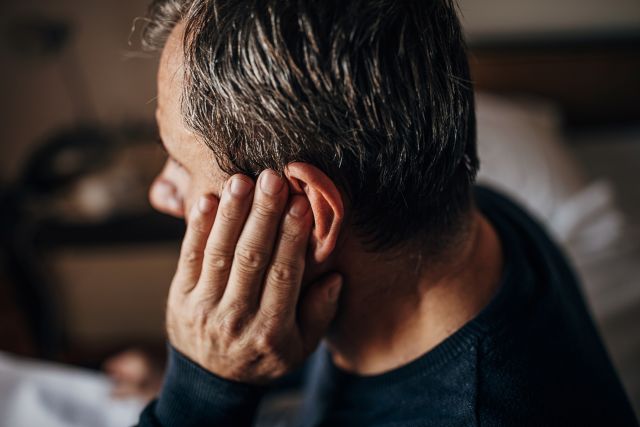Updated on April 17, 2024.
As you get older, do you find yourself asking others to repeat themselves or turning up the volume on your television?
Most people will eventually develop some level of age-related hearing loss, also known as presbycusis. In the United States, about 2 percent of adults between ages 45 and 54 report having significant or “disabling” hearing loss. That rate jumps to 25 percent for those between 65 and 74. It surges to 50 percent for those 75 and older, according to the National Institute on Deafness and Other Communication Disorders.
Age-related hearing loss tends to occur gradually, over time. Many people might not even realize it’s happening. Yet although it’s common, the condition isn’t harmless and should be addressed.
If you’re not able to hear well, you might find it difficult to navigate a world that’s made for people with normal hearing. For example, you could find it harder to have conversations with family and friends. You might even prefer to avoid them, rather than struggle with figuring out muffled words. You might also avoid social situations and phone calls.
Hearing loss can be particularly worrisome if you find it harder to follow instructions from your healthcare provider (HCP), communicate with coworkers, or hear important everyday sounds, such as doorbells, car horns, and other alarms.
The challenges posed for people with deafness or hearing loss may even add to the risk for depression.
Hearing loss and depression
“A link between hearing loss and depression seems to exist,” says Justin Douglas, MD, MS, an otolaryngologist in Lewisburg, West Virginia.
Surprisingly, people with moderate hearing loss may be at higher risk for depression than those with more severe hearing loss, suggests a 2014 study published in JAMA Otolaryngology–Head & Neck Surgery. This could be because people with moderate hearing loss may not seek out or receive help. Many people with hearing loss may also be unaware of resources that can help them access the hearing world.
As a result, people with hearing loss may avoid uncomfortable social interactions. This could contribute to depression, according to Dr. Douglas. “People may withdraw,” he says. “They may quit doing the things they enjoy because they can't hear their friends and participate in conversations.”
Be proactive about your hearing
There are a number of ways to cope with depression related to hearing loss.
The American Speech-Language-Hearing Association recommends getting your hearing checked at least once every 10 years until age 50. From that point on, you should start having regular hearing screenings every three years. Your HCP can perform these.
Knowing the risk factors can also help ensure you address the issue early on, before it gets worse. Aside from age-related wear and tear, hearing loss can result from many other factors, according to Douglas. These include:
- Exposure to loud noises, both recreationally and at work
- Blockage from earwax or fluid buildup
- Injury or illness, including chronic ear infections or a hole/tear in the eardrum
- Health conditions like diabetes, high blood pressure, heart disease, stroke, or a brain injury or tumor
- Certain medications, such as “ototoxic” drugs that are known to cause inner-ear damage
- Family history of hearing loss
Knowing the warning signs of hearing loss is important, too. If you’re experiencing symptoms, it’s vital to bring it up with your HCP. “The biggest sign is if you’re having a lot of ringing in your ears,” Douglas says. “If that ringing is persistent, visit your doctor.”
Other signs include:
- Sounds or speech that seem muffled
- Trouble hearing high-pitched sounds or consonants
- Needing to turn up the volume on the television
- Trouble with phone conversations
- More difficulty having conversations when there is background noise
- Having to ask others to repeat themselves or to speak more loudly or slowly
- Withdrawing from conversations due to problems with hearing
“If you’re out at a restaurant with your friends or loved ones and there’s a lot of background noise and you’re having to ask people to repeat themselves or you’re missing words—and it’s become bothersome both to you and the people you’re speaking to—then this should be discussed with your physician,” Douglas says.
Managing hearing loss can help
One of the best ways to avoid or ease hearing loss-related depression is addressing hearing problems right away.
“If we can detect and manage hearing loss in the elderly quicker, we may be able to prevent some of the withdrawal from society that most of them experience, which likely leads to depression,” Douglas explains. “The earlier we can detect, the more we can prevent people from falling into that downward spiral.”
Your HCP can perform tests at first. If necessary, they will refer you to an ear, nose, and throat (ENT) specialist, also called an otolaryngologist. They may also refer you to an audiologist, a hearing health professional who checks for the type and severity of hearing loss.
An otolaryngologist can help determine if there is a simple explanation or manageable cause for your hearing loss, Douglas says. If your hearing is tested by an audiologist, the results should be reviewed by your otolaryngologist, he adds. Based on your hearing test, your otolaryngologist will figure out if you may benefit from hearing aids, bone-anchored hearing aids, cochlear implants, or possibly surgery.
Hearing aids can be particularly helpful. They may help lower the risk of hearing loss-related depression and improve your social connections and sense of independence. Of the 28.8 million Americans with hearing loss who would benefit from hearing aids, fewer than 16 percent of those aged 20 to 69 have ever tried using one. People without hearing aids who could use them may be more likely to experience depression than those who do wear them.
Other ways to increase accessibility
Hearing aids, implants, or surgery are not the only way to address hearing loss, or to foster communication with others. Some resources you might explore include:
Support groups and organizations: People with hearing loss can benefit from the social and emotional support of organizations that provide resources and community. Examples include the Hearing Loss Association of America (HLAA) and the Association of Late-Deafened Adults (ALDA). Both groups allow you to search for chapters and gatherings at the state and local level.
Sign language: You can search for local opportunities to learn American Sign Language (ASL) through the National Association of the Deaf.
Assistive devices: These can help make certain sounds louder, particularly when there is a lot of background noise. Other helpful tools include:
- Voice recognition software
- Subtitles or closed captioning on televisions or other digital devices
- Devices that connect to doorbells, phones, or alarms that produce loud sounds or blinking lights
Management programs: Programs like individual or group aural (hearing) rehabilitation can help people adjust to living with hearing loss. They teach you how to make good use of remaining hearing, improve communications, and use hearing aids and cochlear implants effectively.
Meanwhile, it helps to be open with friends and loved ones about the trouble you have hearing. If they know you have hearing loss, they may try to speak up, speak more slowly, or make other efforts to better communicate with you.
Recognize signs of depression
People who are struggling with the loss of their hearing may have trouble accessing parts of the hearing world and may be at greater risk for depression. They may feel lonely, withdraw socially, and stop engaging in the activities they once enjoyed. They may develop changes in their usual eating or sleeping patterns, as well.
Someone with depression may also experience one or more of the following symptoms:
- Feeling sad, hopeless, or empty for a prolonged period of time
- Feeling guilty, worthless, or helpless
- Low energy or fatigue
- Moving less quickly or talking more slowly
- Memory problems
- Difficulty concentrating or making decisions
If you recognize any of these symptoms, it’s important to reach out for help.
“Be sure to discuss how you’re feeling with your primary care physician,” Douglas advises. In addition to helping manage the hearing loss, your HCP can steer you to a mental health professional. They can help you manage your depression with a combination of therapy and medication.






